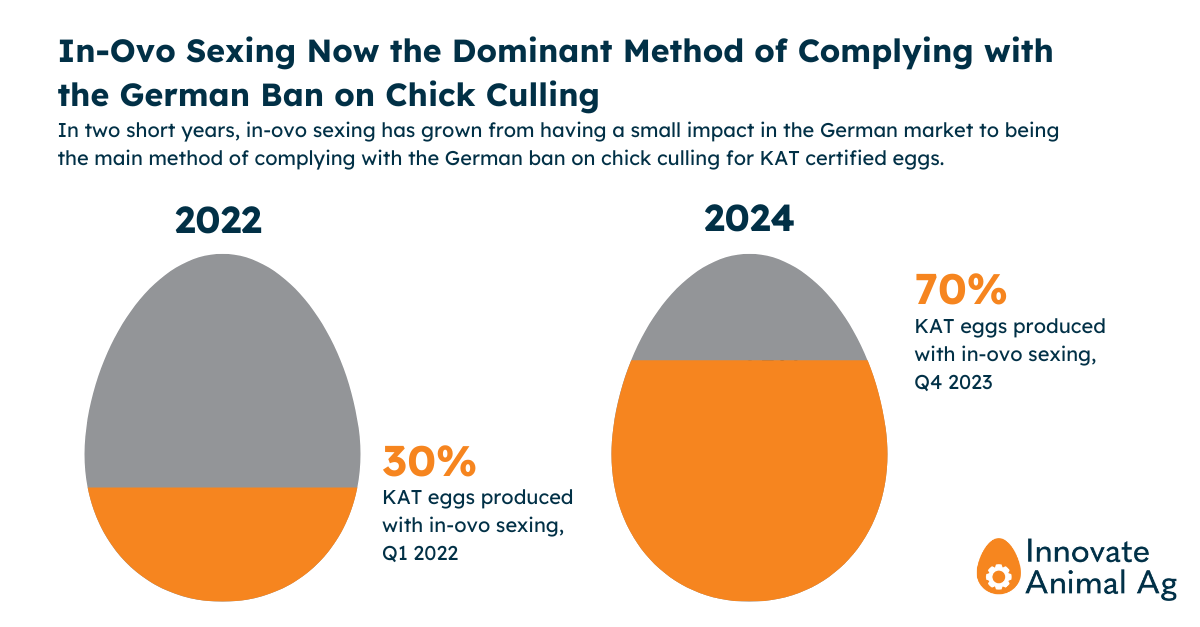In-Ovo Sexing is Now the Main Method of Avoiding Chick Culling In Germany
When the German chick culling ban went into effect in 2022, egg producers initially responded primarily by raising the male chicks for meat, a practice that was costly and unsustainable. However, at the same time, companies began scaling up in-ovo sexing technology as a more economical and sustainable alternative. Data recently released in an interview by the German certifier KAT shows that in-ovo sexing is now becoming the dominant method of complying with the German law. It’s currently used in 70% of cases, versus only 30% in 2022. Dietmar Tepe, the managing director of KAT, said in the same interview that “it can be assumed that in-ovo sexing will be the dominant method for avoiding chick killing in the future.”
KAT is a non-governmental organization that certifies around 90% of retail table eggs in Germany. They audit the entire egg egg supply chain including hatcheries, feed mills, layer farms and egg packers, to ensure product quality and to guarantee that animal welfare claims are, in fact, true.
KAT holds tremendous influence in the German egg supply chain due to their relationship with German food retailers. So as not to disrupt international trade, the German ban on chick culling only applies to domestically produced egg production, not to eggs that have been imported from abroad. But all of the major German retailers believed that it was better for their businesses and their consumers if all eggs on their shelves met the higher welfare standards guaranteed by KAT (including being cage-free and free of chick-culling), and thus made KAT certification mandatory even though it was not legally required. This is ultimately why almost all eggs one buys from a German supermarket are guaranteed to be produced without chick culling.
The reason that in-ovo sexing has proven dominant over raising male chicks for meat is that ultimately the latter is more expensive and less sustainable. In the modern poultry supply chain, chickens are bifurcated into two main breeds - “layers,” which are optimized for egg production, and “broilers,” which are optimized to gain weight as quickly as possible so they can be eaten. Trying to raise males of the layer breed has a few obstacles. First, it requires more food and resources to produce the same amount of meat as a broiler chicken would because they grow slower. Second, the meat of a layer breed also tastes different than that produced by a broiler chicken. Finally, the size of layer males slaughtered for meat is different from broilers, which makes them difficult to slaughter using equipment at a standard slaughterhouse. For these reasons, the meat is more expensive, less sustainable, and often struggles to find a market of interested consumers. A study from the University of Hohenheim in Germany found that raising male chicks in the egg industry for meat would use three times the land, emit three times as much CO2 equivalent, and use 72% more water compared to conventional broilers.
In-ovo sexing, in contrast, is cost-effective and ultimately unlocks productivity efficiencies for hatcheries such as freeing up hatchery space previously used by males. Eggs produced by in-ovo sexing retail for only 1-3 cents more per egg, which includes increased margins for the technology company, hatchery, egg producer, and retailer. This is why in-ovo sexing has grown from having a small impact in the German market to being the main method of complying with the German ban on chick culling in just two short years.
Indeed, Tepe’s prediction is coming true across the entire EU. In the five years since the first in-ovo sexing machine was installed in a commercial hatchery, in-ovo sexed hens now account for over 15% of the European Union’s layer flock. Additionally, the technology is no longer restricted to countries with a ban on culling, as demonstrated by the inroads made in Norway, Spain, Belgium and the US. Over the next few years, it seems clear that in-ovo sexing will achieve a global reach.

